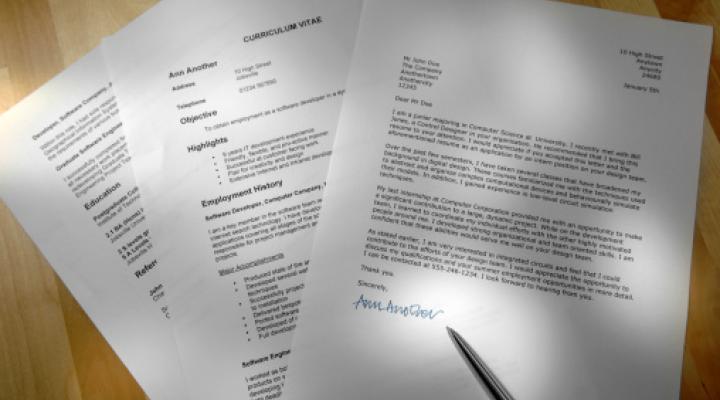Writing a Cover Letter

It serves as an introduction to your resume and allows you to showcase your skills, qualifications, and personality to a potential employer.
A well-crafted cover letter can set you apart from other applicants and make a positive impression, increasing your chances of getting an interview. In this guide you can learn about the elements of a cover letter, its importance, and tips to make your cover letter stand out.
Header
Start your cover letter with your contact information, including your full name, phone number, email address, and optionally, your mailing address. Followed by that, include the date of writing and the recipient's contact information, such as the hiring manager's name, title, company name, and address. If you're unsure about the recipient's name, do some research or call the company to find out.
Salutation
Address the hiring manager or the specific person responsible for hiring by their name, if possible. Use "Dear Mr./Ms./Dr. [Last Name]" or "Dear Hiring Manager" as a fallback option if you don't have a specific name. Avoid generic salutations like "To Whom It May Concern."
Opening Paragraph
Grab the reader's attention by explaining why you are interested in the position you’re applying for. You can start with a compelling statement or try connecting your passion with the company’s goals.
Body Paragraphs
Use the body paragraphs to highlight your relevant skills, experiences, and achievements. Connect these to the job requirements and demonstrate how you can contribute to the company's success. Be concise and specific, providing examples that showcase your abilities and accomplishments. Avoid repeating the information already mentioned in your resume; instead, focus on elaborating and providing context of your experience in more detail.
Research and Customization
Research the company thoroughly and demonstrate your knowledge in your cover letter. Show that you understand the company's mission, values, and recent achievements. Tailor your letter to the specific job by aligning your skills and experiences with the requirements outlined in the job description. This customization demonstrates your genuine interest and attention to detail.
Soft Skills and Personality
In addition to technical skills, employers often seek candidates with strong soft skills such as communication, teamwork, problem-solving, and adaptability. Use your cover letter to showcase these qualities by providing examples of how you have demonstrated them in previous experiences. Let your personality shine through, but maintain a professional tone.
Closing Paragraph
Summarize your qualifications and express your enthusiasm for the opportunity to interview for the position. Reiterate your interest in the company and why you believe you would be a valuable addition to their team. Thank the reader for considering your application.
Closing and Signature
End your cover letter with a professional closing, such as "Sincerely," or "Best regards," followed by your full name. If you're submitting a digital cover letter, you can include a typed signature. For a printed cover letter, leave space to sign your name by hand. Save your cover letter as a PDF for easy sending.
Tips to Make Your Cover Letter Stand Out
- Keep it concise: A cover letter should ideally be one page in length. Use short paragraphs and bullet points to make your letter easy to read and navigate.
- Be professional: Use a formal tone, correct grammar, and professional language throughout your cover letter. Proofread carefully for any typos or errors.
- Quantify your achievements: Whenever possible, use numbers, percentages, or other quantifiable metrics to illustrate your accomplishments. This adds credibility and makes your achievements more impactful.
- Use keywords: Incorporate relevant keywords from the job description into your cover letter. This can help your application pass through automated applicant tracking systems (ATS) and catch the attention of the hiring manager.
- Show enthusiasm and confidence: Display genuine excitement for the position and the company. Use positive language and convey your confidence in your ability to contribute to their success.
- Keep it focused: Avoid going off-topic or including irrelevant information. Stay focused on the skills, experiences, and qualities that directly relate to the job you're applying for.
- Proofread and edit: Before sending your cover letter, proofread it carefully for grammar, spelling, and punctuation errors. It can be helpful to read it aloud or ask someone else to review it for you.
- Customize for each application: Tailor your cover letter for each job application to highlight the most relevant aspects of your background. Avoid using generic templates or copying and pasting the same letter for multiple applications.
- Follow instructions: If the job posting specifies certain requirements for the cover letter, such as format or specific questions to address, make sure you follow them precisely.
- Be professional in all aspects: Use a professional email address and ensure that your voicemail greeting sounds professional in case the employer calls you. Additionally, be mindful of your online presence, as employers may research you online.
Remember, a well-written cover letter can significantly enhance your chances of standing out in the job application process. Take the time to customize a compelling letter that highlights your qualifications and matches the company's needs, it may be the factor that helps you secure the job you are applying for!
The information provided on www.onepercentforamerica.org is intended for general informational purposes only. It should not be considered as professional advice or a substitute for seeking professional guidance.



